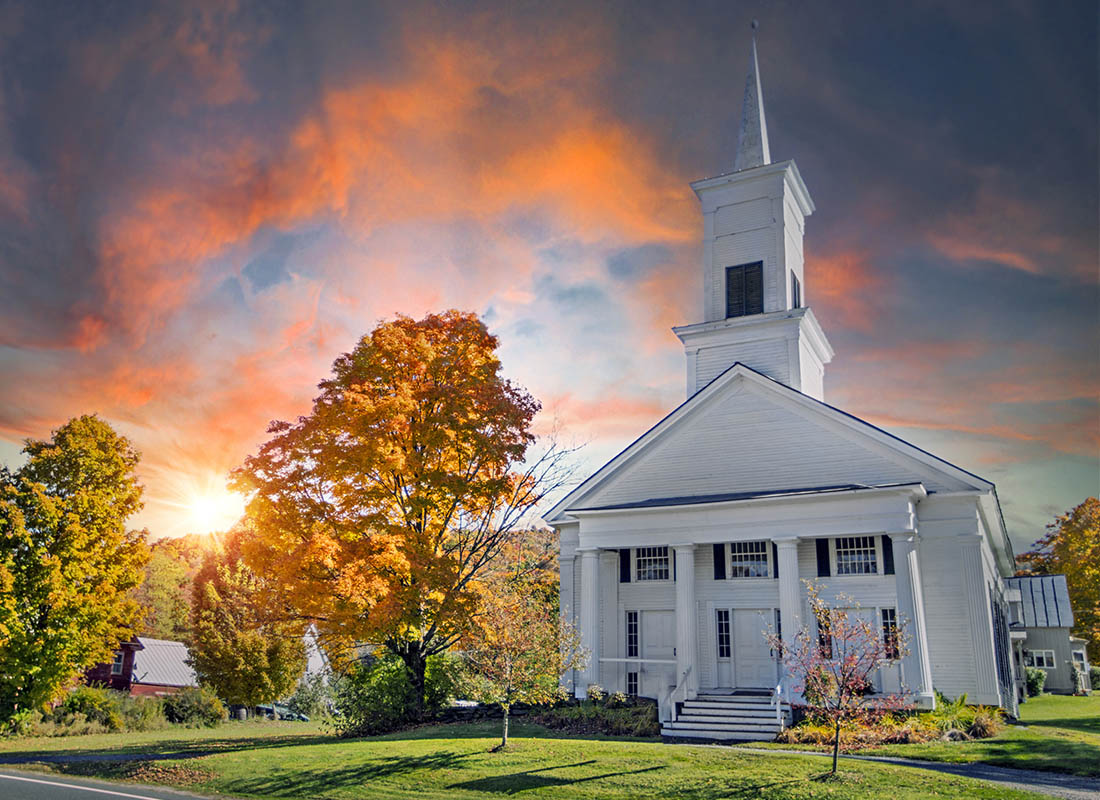
Pray for the best and prepare for the worst with church insurance.
Find peace of mind when insuring a house of worship.
When insuring a house of worship, you need to think of it as a building, but also as a community center, an employer, and in some cases, a religious leader’s home. With church insurance, you may find coverage to help bring you peace of mind.
What does church insurance cover?
Church insurance is a type of business insurance that protects the owners of houses of worship against specific risks. There are many different coverage options that may or may not apply to your house of worship, which is why there is no one-size-fits-all solution. For example, a church insurance policy may take care of the obvious costs such as property damage from theft, vandalism, and natural disasters, but may also cover the unexpected associated costs for those covered events. This could include having to update the building to comply with local ordinances when carrying out repairs after an incident.

Stained glass is often very valuable and sometimes priceless. Several hundreds of thousands of dollars might be needed to refurbish the stained glass. If it’s damaged by vandalism, hail, fire, or other means, it can be very costly to fix. Finding a qualified contractor may also be challenging.
Depending upon your insurance coverage, an appraisal of your stained glass damage could be free of charge. In addition, consider including the value of the stained glass in the building limit of the church, and also include coverage under the church’s blanket limit. Some insurance companies may treat stained glass as part of a fine arts floater. Either way, this helps ensure the proper coverage in the event that something bad happens.
There are hundreds of reports each year of people being sexually abused by clergy, church staff, volunteers, and congregation members. Countless more are abused without any report being made.
Obtain the proper abuse or molestation coverage to protect the church in the event of an allegation arises. In addition, consider having a written document to address how to prevent sexual abuse from happening and what to do in the event of an allegation.
Church volunteers and employees often use personal vehicles to do work for the church.
Make sure to add hired and non-owned auto coverage to the church’s insurance policy to cover this exposure. Also, check the motor vehicle records for anyone who drives other members…especially kids.
Churches sometimes have very closely held beliefs that may open them up to potential lawsuits in the event the church’s beliefs cause someone else to feel wronged. An example might be a church refusing to perform a same-sex marriage, which results in a lawsuit.
Consider adding religious freedom coverage. This insurance can protect the church in the event it is sued because of closely-held beliefs core to the church.
Almost all churches have some form of board of directors that makes financial and operational decisions on behalf of the congregation. An organization once sued a church for improperly using their trademarked property while promoting a fundraising event. The total loss and defense costs totaled $400,000.
Directors and officers liability insurance protects the decision-makers of the church from lawsuits and claims. Instead of suing the individuals directly, the lawsuit would be defended by the church’s D&O policy. Most people who serve on a board in a volunteer capacity should demand this coverage before serving.
Roof claims are the most common claims that churches face. Each year, billions of dollars of damage are typically paid as a result of storm damage.
Ensure you have the proper coverage and confirm that you are insured to full replacement value. In addition, make sure your insurance policy includes replacement cost coverage for roof claims for wind and hail.
Security in churches is becoming a larger issue as attacks have increased in recent years.
Every church should have a security plan. This plan should detail where parishioners go in the event of an emergency, which entrances are open during worship times, who should contact the authorities, how to spot someone who may pose a security risk, and how to react to someone who is trying to cause harm to parishioners.
Religious Leaders often find themselves giving counseling to couples or other church members. In addition, religious leaders could be at risk of a lawsuit for what they say in the pulpit.
When it comes to counseling, religious leaders should have clear guidelines on what is acceptable in a counseling situation. In addition, religious leaders should be trained to know what needs to be reported to the authorities in the event of an extreme situation. Adding professional liability coverage to your church’s insurance policy can help protect the religious leader and church from claims or lawsuits arising from what the religious leader says at the pulpit or when teaching or preaching.
Most common coverage options for houses of worship.
Houses of worship are unique in the type of insurance they require for the risks they face. Ensuring that your house of worship is properly covered is important, and here are a few of the coverage options that may be added to a church insurance policy:
- Abuse and Molestation Liability
- Directors and Officers Liability
- Hired/Non-Owned Auto
- Professional Liability
- Religious Freedom
- Stained Glass
The gaps that church insurance fills in.
The list of coverage items that an ordinary policy might not include is lengthy. Examples include defibrillators or other equipment needed for large groups of visitors, the personal property of religious leaders, and even the costs of repairing or replacing things like stained glass windows. You may also be able to get coverage for church events, child care, as well as ministers and pastors liability, which are all specific to the day-to-day operations of houses of worship.
Coverage for the unexpected.
There are things that are unplanned, but your house of worship still needs to be prepared for the unexpected. You may want to get coverage for liability issues, travel risks on mission trips, and the costs of recruiting a suitable religious leader if a replacement becomes necessary. These are risks that may come out of nowhere, but having them under your policy may help bring you the peace of mind you need.
Are you ready to protect your house of worship with church insurance? Contact us to go over the risk factors and insurance needs of your house of worship, as well as your coverage options.
Let’s Get Started
Church Insurance Quote Request
"*" indicates required fields
Don’t like forms? Contact us at 904-261-3606 or email us.
